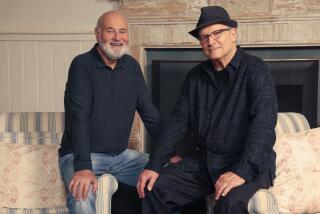Activist, Entertainer’s Life Is a Timeless Story : More than 10 years after first playing Paul Robeson in a controversial play, an actor continues to reprise the part
As blacks marched in the streets and starved in the slums of the Deep South in the early 1960s, Avery Brooks, a teen-ager in another world--Indiana--volunteered to join the front lines.
But his parents forbade it. They knew too much about the roots of racial bigotry in the South. “They grew up in Mississippi,” Brooks said, “and they were scared.”
So Brooks watched America’s new civil war on television and found another way to express his heritage--on stage. He ran a company for black actors. He played the title role in an opera about Malcolm X. And in 1981, at a 100-seat theater in New Brunswick, N.J., he took on the part of activist/entertainer Paul Robeson. It was supposed to be a three-week run. A decade later, he’s still reprising the role.
“You can’t talk about American history,” said Brooks, who will open Wednesday in “Paul Robeson” at the Westwood Playhouse, “without talking about him. He’s one of the greatest Americans we’ve produced. Robeson talked about apartheid in the 1930s, democracy in China in the ‘40s. When you talk to people who knew him, invariably, it was as if the world stopped when they met him.”
Brooks, in his 40s, has starred on television (“Spenser: For Hire”), directed plays and taught drama at Rutgers University, and always, he has come back to Robeson--for about 100 performances a year.
Robeson was a black man born in 1899 in Princeton, N.J. He was a star athlete, actor and singer who spoke out against racial persecution long before anyone had heard of Martin Luther King Jr. or Malcolm X.
Robeson also advocated socialism, and he paid for it. The government called him a Communist and took away his passport from 1950 to 1958. Robeson invoked the Fifth Amendment, refusing to reveal his political affiliation at hearings before the House Un-American Activities Committee. By the time a Supreme Court decision restored his passport, Robeson’s health was failing. He died in 1976.
The play, written by Phillip Hayes Dean, follows Robeson’s life, from his days as a football star at Rutgers to practicing law at a Wall Street firm to emerging as a new star on Broadway and, finally, to speaking out against racial persecution in the late ‘40s and ‘50s. Brooks sings, dances, narrates and re-creates Robeson’s oratory skills. Ernie Scott plays the piano in this two-man production.
“Avery becomes the man,” said director Harold Scott, who has directed regional theater across the country. “He does not do an imitation.”
The play has raised almost as much controversy as the man it’s about. When it premiered on Broadway in 1978--James Earl Jones originated the Robeson role--a letter appeared in Variety declaring the production a “pernicious perversion of the essence of Paul Robeson.” The signers--who included Coretta Scott King, Julian Bond and Paul Robeson Jr.--felt that the play overemphasized Robeson’s life as an entertainer while downplaying his work as an activist who inspired millions of disillusioned blacks. Author James Baldwin said the play presented Robeson as a “chocolate John Wayne . . . moving, charming, noble, innocent and above all, irrelevant.”
Playwright Dean was outraged and let Harold Scott and Brooks take on the play in 1981 if they agreed not to change one word of the text.
In 1988, Robeson’s son had only slightly softened his initial objection to Dean’s play.
“I still think that in its lines the play was about somebody else, not my father,” Robeson told the New York Times. “It bases its appeal on the popular culture, on show business, and leaves out much that was not just important but was essential.
“But I also feel that Avery Brooks has gone beyond the lines to communicate a convincing portrayal. I have seen this production and I congratulated the actor and the director, though I repeat, I still feel the character as written is a counterfeit.”
Dean, reached in New York, refused to comment on the criticism his play has received through the years.
But Brooks said, “We have to preserve the right to give our version of history, whatever that is. There will never be an exact version.”
Brooks isn’t finished fine-tuning the character. In recent years, he lost both his parents, which allowed the actor to better understand some of the setbacks Robeson experienced throughout his life.
“When my parents passed away, I had to behave better than ever because I didn’t have anyone to answer to anymore,” Brooks said. “Robeson lost both his parents when he was young, and that had to affect him a lot.”
Still, Robeson overcame his early losses to establish a remarkable career. Playwright Eugene O’Neill saw him act in an amateur production and, in 1924, offered him roles on Broadway in “All God’s Chillun Got Wings” and “The Emperor Jones.” Robeson is perhaps best remembered for his rendition of “Ol’ Man River” in the 1936 film version of “Show Boat.” His bass-baritone voice brought wide acclaim and led to successful concert tours of Europe and America.
In “Paul Robeson,” Brooks sings segments of 32 songs.
“In this play,” Harold Scott said, “if the actor doesn’t sing, you’re in big trouble. Avery sings, while James Earl Jones didn’t, and that’s a big difference.”
Brooks grew up in a musical family. His mother played piano; his father sang in a gospel choir.
“We didn’t learn to sing,” Brooks said. “We just sang.”
Brooks, however, doesn’t feel that his career is confined to the stage. From 1985 to 1988, he was Hawk, a free-lance enforcer on “Spenser: For Hire.” The most difficult part of that role, he said, was maintaining integrity in a medium not always recognized for that quality.
“I held the line as much as I could,” Brooks said. “I wanted to remain a character that would resonate in the African-American community, which he did.”
No matter what direction his career takes, Brooks is certain he will not give up Robeson.
“His story is timeless,” Brooks said, “and the fighting for human rights will always go on.”
“Paul Robeson” runs Wednesday through Feb. 2 at the Westwood Playhouse, 10886 LeConte Ave. Performances are 8 p.m. Thursday - Saturday and 3 p.m. Sunday. Tickets: $22.50-$30. Call (310) 208-5454.
More to Read
The biggest entertainment stories
Get our big stories about Hollywood, film, television, music, arts, culture and more right in your inbox as soon as they publish.
You may occasionally receive promotional content from the Los Angeles Times.










